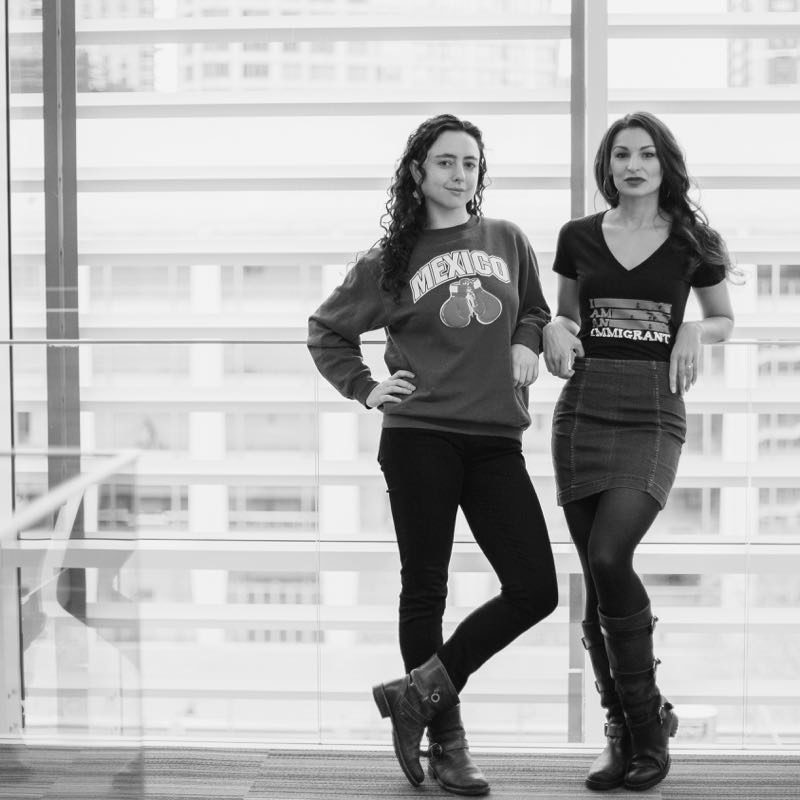Martyna Majok and Danya Taymor on “queens”
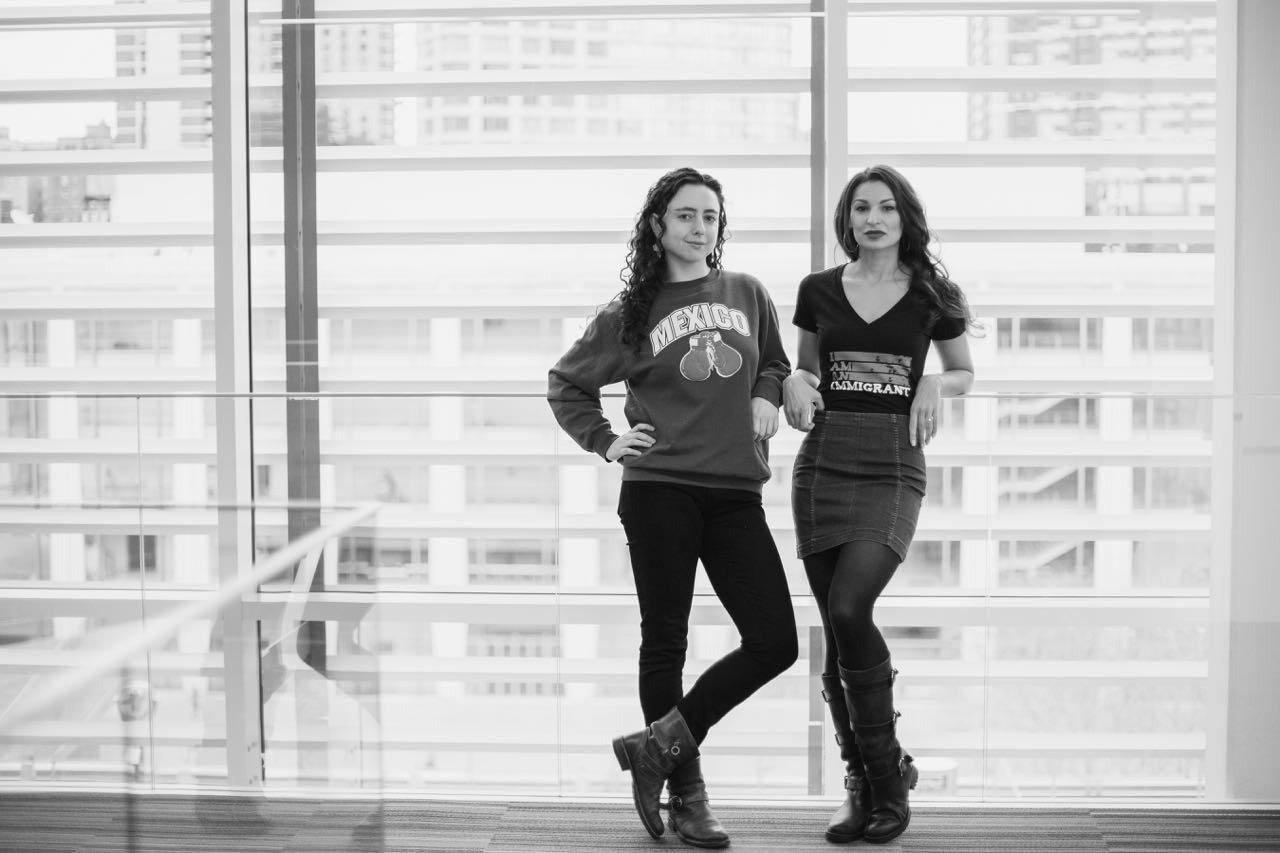
Written by Victoria Myers
Photography by Tess Mayer
March 1st, 2018
In the new play queens, written by Martyna Majok and directed by Danya Taymor, a group of female immigrants find their paths crossing in a small apartment in Queens. The apartment might be small, but the play is a big tale that spans shifting decades and continents—and shifting ideas of identity and belonging. Currently having its premiere production at LCT3 at Lincoln Center Theater, Martyna began writing the play in 2016 and it was developed as part of Women’s Project’s Pipeline Festival, and at Berkeley Rep and the O’Neill Center. During a break from tech, we spoke to Martyna and Danya about the process of writing and staging queens, autobiography in work, and how they structure their lives as theatre artists.
What have you found the most interesting about this process, or what’s something new that you’ve learned about the play?
Danya: It’s been very interesting to be working in the current political climate because immigration law and immigration “reform” has been in the news every day. This play is speaking directly to the time. Martyna is writing stuff that feels like it’s reacting to the news in real time. I think that’s been one of the coolest things, to be able to make something that feels live. So many times with theatre, because of the timeline and how things work, your great idea that was topical, by the time you’re doing the play, that moment has passed. It feels amazing to be making something in the moment that it feels extremely relevant, not that this stuff goes away.
Martyna: I started writing it in March or April of 2016. We were in a somewhat different time, but not that different. All of these things have been percolating. This scapegoating of immigrants, especially, has been percolating.
Something that’s interesting that I discovered was that I started the play from a really personal place. I was born in Poland and I came over young. My whole family stayed. My mom is here, but my whole family’s back there. We grew up low-income, so we weren’t able to go back very often to see family. There was one year where a very close family member of mine had passed away and I couldn’t afford to go to the funeral. I had realized that I had become an American by default. Because I hadn’t been able to go back so often and maintain those relationships as well as I could if they were here, I realized that I frayed those connections. I started thinking about all the people that I grew up with. I grew up in a multicultural immigrant neighborhood where everyone was from everywhere and where they were leaving children, they were leaving whole families as adults. They experienced it a lot more strongly [than I did] and I started thinking about them, and this play came about. It started from thinking about the things that I had left and what does that mean as an immigrant or as anybody who moves.
It started there, and then as we were working on the play, especially now, I’m realizing that it’s in conversation with this American mentality of what happens: What is, literally, becoming an American? What is that mentality? Becoming individualistic? Sometimes becoming a capitalist and a bit selfish? What does it mean when the group mentality, the community, becomes individualistic, and watching a character who, at one point just came to the country, was low-income, and seeing how she forgets where she came from in kind of tragic ways.
Danya: And also how she changes as she rises. As she gets more purchase [power] and finds herself in a better place as America would see her, a lot of the characters talk about who they are versus who they are in the eyes of America. It’s interesting that as she gains traction in the eyes of America, she loses other things. She has to give up other things in order to gain. I don’t think that the play paints a totally negative picture of what it means to be American, either. I think that, ultimately, it shows both sides of the journey. That’s what’s exciting about it.
Have you had to find a balance between keeping your initial impulse of why you wanted to write the play while also incorporating some of what’s going on in politics or how you feel the audience will walk into the play differently now than a year ago?
Danya: What’s cool about the play is it’s this weird prophet moment for Martyna, because it’s not that the play has changed, it’s that everybody is going to see the play in a different way because consciousness has evolved. I think that’s the biggest difference. Words haven’t changed, but we view seven women on stage now, post-Harvey Weinstein, post-Donald Trump, in a different way than we would have viewed them before that all happened. So it’s interesting that things haven’t necessarily changed so much in the writing, but more like people will appreciate them in a different way, hopefully, or they’ll have a bigger impact because the times are changing and it’s changing so the play can have its most potent impact.
Martyna: It comes from a personal place for me where most of these people are composites of people I know. There’s a Dreamer, because I grew up with a bunch of people who were undocumented—we were undocumented for a time—and people who weren’t able to go to college and things like that. For me, these are just the people I grew up with and my friends and my family. People from the outside might be like, “Oh, this is very timely.” I’m like, “Yeah, but those are the people I just grew up with. They’re just the people that I know.” I haven’t really had to make anything clearer about what’s going on. We came into rehearsal and people are like, “Did you read this? It’s just like the play.” I’m like, “Yeah, well, it’s been going on for a while.”
Danya: I also think a good thing about the play—and another reason why the personal and the political haven’t contradicted each other—is that there are two very clear parallel ways of storytelling going on in the play, and they travel together. This personal journey of a woman who left her country, her daughter, her family, and that’s totally entwined with the change of this country from 2001 to 2017, because we watch her move through time, we watch the country move through time. I think it’s very effective because you can’t separate the two. When you separate politics from personal, that’s when people can and do lose interest. It’s when you link them so tightly that it has the biggest potential impact.
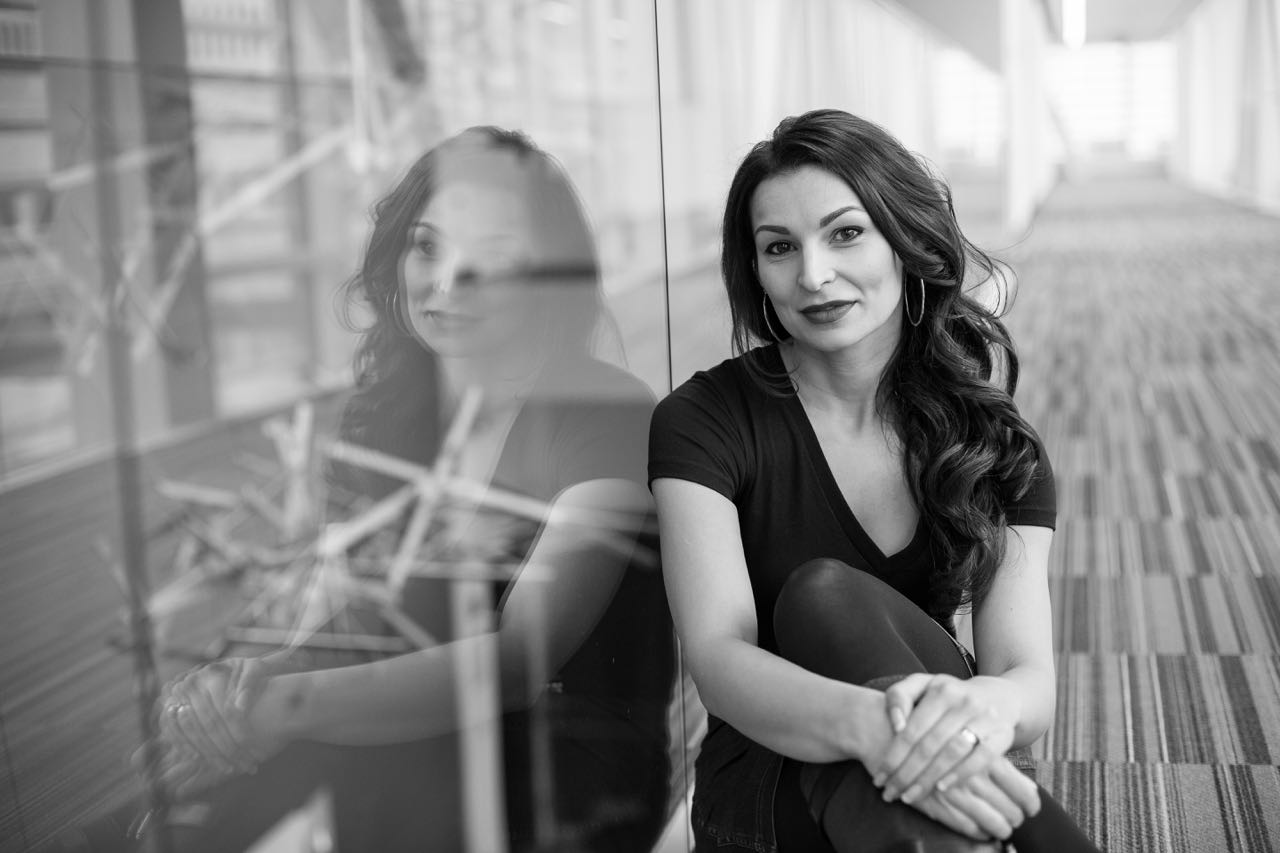
It’s an all-female cast. Have you found in working on it that you’ve had to think a little bit more about how society views women’s bodies on stage? Actresses have often commented that they feel the pressure to make female characters likable. How do you operate within a culture and a society that has lots of ideas about how women should behave and be seen?
Martyna: It’s hard, because you just are who you are and then other people outside will reflect what they think about it. It’s really hard to juggle that. We’ve had a lovely shorthand, which has been awesome, in our room. The likeability question, I love this question because I’m constantly butting up against it. I write low-income, often immigrant women, and that’s three levels of other-ing that happen with my characters, and so they can never be just a character. The default character is a straight, white male. An Arthur Miller character is a character. Because [my characters are] other-ed in society, they’re other-ed in this world, I wonder about how much I have to explain about visas, how much we need to explain just so somebody can understand the narrative that, for me, is shorthand. There’s a balancing of that just so everyone is on the same plane of information. But likeability, if a character is pursuing what they want and they have strong convictions and they have humor, that’s all I can do. If they don’t like it, then they’re probably not going to like a lot of people in the world.
Danya: I wonder sometimes if actresses are put into a position where they have to capitalize on their sexuality first, before anything else. It’s not that we are taking away the sexuality or anything of that of our characters, but I think one thing that’s been important is they lead with who they are and what their actions are first. There’s a moment where a character changes clothes on stage. There’s no nudity. It’s in there because that’s what women do when they’re alone. It’s presented in a way that’s not sexualized. I can’t remember the last time or if ever I’ve seen something like that on stage, which is real, and yes, you see somebody’s body, but it’s in an everyday way so that you can see how they live. I agree with everything Martyna’s saying. Some characters in the play are more likable than others because every person has a spectrum of likeability. Renia, the main character, is more likable in some moments than she is in others because she’s a human being. I think that’s been what’s been most exciting about doing this play with seven women, is not thinking about it as a play with seven women, just thinking about it as a play with seven people.
I noticed that at the beginning of the script there’s a little note, and I’m paraphrasing here, along the lines of, “The characters shouldn’t be played with pity.” I thought it interesting that you felt the need to include that.
Martyna: I think because if you read the language, they’re just stating the facts of their existence. Some people might read that as pitying themselves, but they’re literally just saying the facts of their life. Some of the facts of their life are devastating and they are just matter-of-factly saying, “This is my life. Period. I’m not asking you to pity me. I’m not asking for anything. I just need to inform you or I need you to know this about me so that I can tell you something else.” The worst would be for me to feel like people are performing this like asking for some kind of, “Oh, I feel so sorry for you.” Because we can’t move forward.
Danya: I think Martyna’s note in the script tells it to performers, but I think the way we’re attacking the play will hopefully make it clear to audiences that you take away somebody’s power when you pity them. You take away their agency and their ability to be full human beings when you pity them. It starts with the characters. They don’t pity themselves, and I don’t think that the audience is going to pity these characters, either. I think that’s important for their power as human beings to be seen as equal rather than as someone who…
Martyna: Needs accommodation or something like that. [All the characters] are women who have some connection to another country, whether they’re first generation or just recently arrived or the children of other immigrants. I wanted to have a play that contained people from very different places because oftentimes when we have an “immigrant play,” they’re from the same country, they’re all living in a house. We rarely get to see a group of women who are from totally different places who get to have a conversation with each other and are all on the same plane. That’s been exciting to explore with this group of actors and in the play.
You’ve touched on the idea of how different cultures have different ideological organizations like the idea of the individual versus society. A lot of people view Americans or America as being a society that is rooted around the individual and their path versus some other cultures where it’s more about society as a whole. How did you address not only the fact that these are people with different languages and different cultures, but also there’s a way that they view the world that is organized sometimes differently than one another?
Martyna: I guess that’s something I’ve kind of had to create. All these women at one point, when they came to America, lived within their communities. They came to a community where other people from their country of origin were also living. Something happened within those communities that made them have to leave. So they were double immigrants, in a way. They came from one country, came to America, but were in an immigrant community there and then had to leave it because of internal problems like falling out of relationships, jobs falling through, things like that. They’ve left and come to this place and started living with other people. It becomes a practical thing that they have to work together. In a sense, it’s like an ideological idea of how this country could work: we can all just help each other and work together and live together in this way and enrich each other. Yes, there’s going to be problems, but it’s possible.
Danya: I think one thing that is interesting about the play is that while it does investigate these cultural differences that each woman brings from her own country, I think it allows them to speak about their differences as human beings first. So their personality trumps their cultural background in a way that’s really exciting. The fights that they have or the arguments that come up, for the most part, are really personal and really universal. There is something thrilling in seeing people who you assume a lot about based on where you think they’re from or what their experience has been, have interactions that aren’t only based on where they come from or what they know. They’re based on who they are and who they’ve become from those experiences.
Martyna: I remember getting notes early on from other people that were like, “We need to know more about… we need to know everything about these people’s histories and cultures and all this stuff.” I have wanted so much just to have it be people talking to each other that happen to also be from XYZ place.
Danya: It’s thrilling that it’s seven women on stage and it’s a reflection of our times that that is something we must talk about, because we have to talk about it. But it would be unbelievable if people could just relate to the characters in this play as human beings and not as women and not as immigrants. I think that’s something that the play helps achieve for the audience. If they come in thinking a certain thing about low-income people or about immigrants or about certain kinds of immigrants, the play disproves all their biases. Maybe not all, but at least enough so that they begin to see these women as people who aren’t able to be pigeonholed or put into boxes.
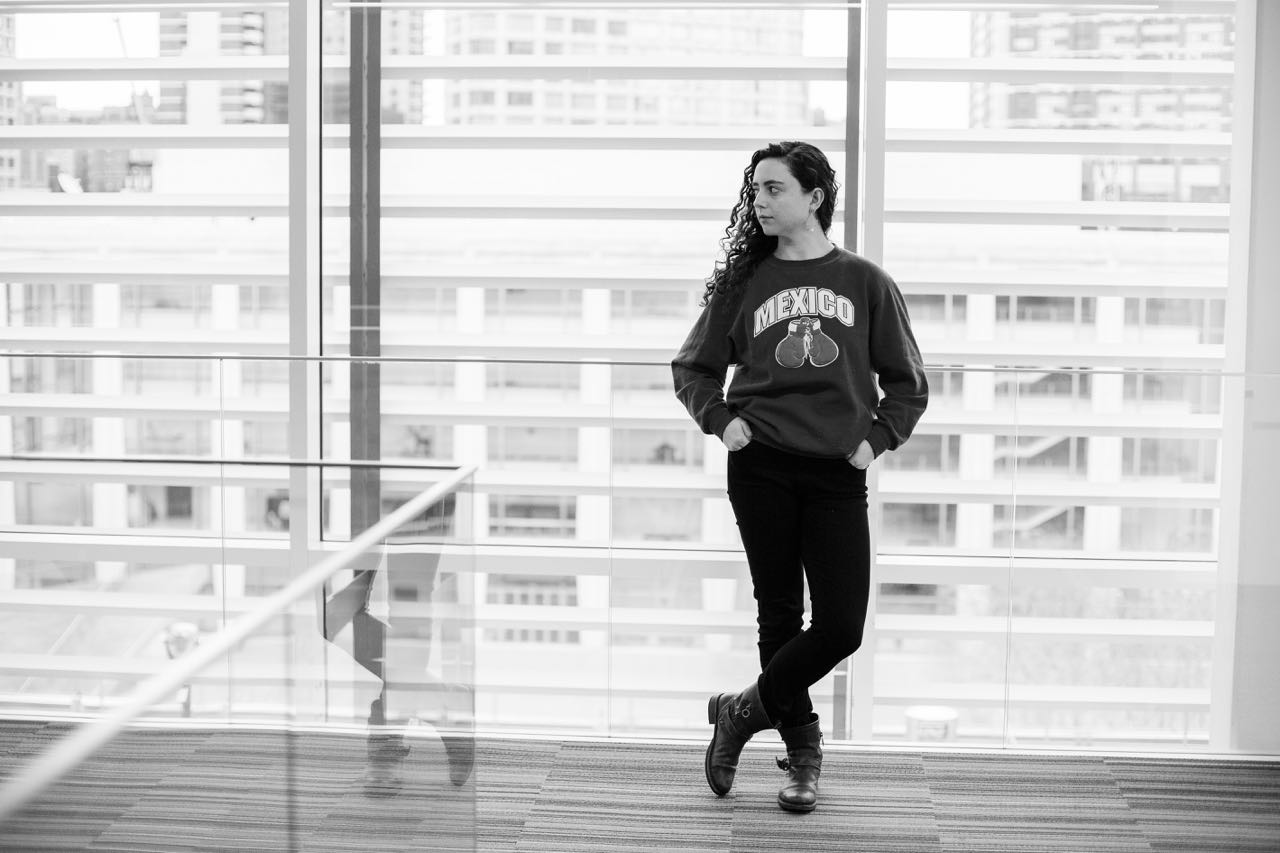
Martyna, you mentioned before about some of the characters being composites of people you knew. I was reading some old interviews you did around Ironbound where people kept on asking, “Is it based on your mother?” For you as a writer, how does the assumption of autobiography in your work or being asked to talk about it affect you as a creative person and how you feel the work is viewed?
Martyna: I wouldn’t be able to write “about myself” because I would start to edit or editorialize something or censor, but if I have the mask of another person that’s like me [then I don’t do that]. I have many masks in queens where I’m able to pull aspects of myself and my story and the stories that I’ve heard growing up and hear now. That enables me to create a character that is flawed, that yearns, and all these things. The worst thing would be to write with what I call the author avatar, which is the character that’s like the same age as the playwright and that is from the same place. All the things happen to them. They’re not active. The action doesn’t come from them. They’re just this passive character. I think that comes from a fear of really looking at yourself. It’s hard to access it that way.
It’s really hard when you feel like your biography is being analyzed when you’re just endeavoring to, one, write a character and two, get to something deep about the human condition, which you can only do when you feel safe to go as far as possible. If you feel like you’re being judged from the outside as though this is you, that impedes that process of creation. This is where the masks and composites come from. It’s tough. I wish that wasn’t a part of it all. It’s important to know where people come from, but then people have to let it go to not be trying to do detective biography work when they’re watching a play.
People have written about how there’s a lot of anecdotal evidence, or maybe even a study, to suggest that biography is assumed much more when it’s a female writer rather than male.
Martyna: I wouldn’t know, because I’m only asked those questions. I love that there’s a study that actually looks at that, because I’ve just been so used to being asked those questions that I just assumed that everybody was. But, right, that makes total sense.
Danya: I think I read the same thing that you did. Yeah, because you can’t possibly have an imagination. How could you possibly think about these things and make stuff up?
Martyna: Right. No, no, we’re just in the kitchen. I think in those things too, I’m proud of where I come from. I’m proud of the people I grew up with and the circumstances I grew up with, because ideally, there’s some kid who’s reading this who’s a big theatre nerd, or doesn’t know they’re a big theatre nerd, and they need to see that this is possible. It’s hard to come from a low-income background and be first generation and become a playwright, but there are so many of us that are doing it right now, and I think that’s important for people to know so that they know this is a possibility for them, too. Then we do that and [writers] are like, “Oh, is this you?” And you’re like, “No. I mean, kind of, but no. I also wrote a play. It was really hard to do.”
I want ask you about your collaboration and working together. It seems that one of the things that doesn’t happen so much in grad school is actually figuring out how to collaborate and work with people. What do you think it is about your collaboration that works well? What do you think is the most important aspect of why it works?
Martyna: I think we’re both trying to make a really good play. It’s not like she’s trying to be a good director and I’m trying to be a good playwright. We’re trying to make a good play, a play that works, that we can stand behind. I think we’re united in that always. It’s not about one person’s ideas winning out, it’s about what serves the story.
Danya: I think in the room that extends not just to us, but to the actors, the designers, even to stage management. Our ASM, Hilary, had a better idea for a transition, and it was welcomed. I think that an interesting thing happens when you break up hierarchy. It allows creativity to flow in a way that is exciting and where people can suggest something that is brilliant without fear that they’re stepping out of place or they need to ask permission. It creates an environment that’s very playful. Even between the two of us, when we’re just talking about what the play needs, she can tell me something about blocking or staging and it doesn’t make me feel uncomfortable. Same thing with the story. I think that freedom and letting go of ego is important in collaboration. As long as everybody knows that they’re united, like Martyna was saying, in the work, and in making the work great, then I think a healthy collaboration can form.
Martyna: And we respect each other. Everybody has their own different process and we’re accommodating to that. It’s not trying to tell them to change who they are or either of us changing who we are, but working together. It’s been really wonderful.
You’re both still considered more emerging in your careers. If there was one thing you could change that would make your careers easier, what do would it be?
Martyna: Health insurance. Legit health insurance. Saying reviews feels like a very dangerous thing to say, but I would like to not be other-ed [by critics]. Hopefully we will not be other-ed by having a play about characters that happen to be low-income immigrant women. I’m very proud to be a woman, I’m very proud of where I come from, but [in reviews] it’s like, “Good job for a woman. Good job for a…” I really hope that doesn’t come into play. Emerging is definitely part of it, because when you’re younger, there’s more to prove. But I hope that that’s not something people have in their brains when they’re looking at this work critically. I hope we’re not other-ed and someone can only access the art in that way.
Danya: Yeah, there’s an interesting thing that happens sometimes where as an emerging artist, if you’re writing about a certain subject, you are compared against two other people writing about something that actually isn’t that related, but because, for example, it’s low-income or it’s an immigrant story, you’re compared against those things when you should be just compared to the standard of good work.
I think in general—this is not related to this process because I actually think that from first pages to production, this is one of the fastest and most incredible tracks—I would just say more opportunities for production faster. Let people prove themselves in production. I think that would be useful for theatre and also just useful for playwrights, because they can get their work out there and then they can move on and keep writing, as opposed to having to return to something when they’re no longer the same person as they were when they started writing it.
What was your process like for figuring out the lifestyle around your careers? That seems like something else where there’s not a lot of guidance because it’s not the normal nine-to-five thing, and instead you’re working freelance and you’re working wherever, and also balancing a personal life and figuring out how live a life.
Danya: There is no blueprint for how to do it. I think that between us, the jobs that we’ve had before, being able to live on the salary that you make doing the things that you want to be doing, are many. At different times, you need different things. You might have a time where you can make your living from directing or from playwriting, and then there’s a time where suddenly you can’t anymore. It’s tricky and challenging and there’s no one way to do it. It depends.
Martyna: I think because of how I grew up, where money was never necessarily a guarantee, I have taken on more jobs in the theatre and in life than are healthy to do. It’s hard for me to say no because I don’t know when I’m going to be paid next time. I take on all these things until it feels impossible to get through. But now I’m getting to a place where I’m realizing that my body is finite, my energy is finite. There’s no blueprint, there’s no road map for how to do this, but I think everyone finds their balance or life makes you find the balance. I remember there were weeks where we’d be doing workshops, and I’d get maybe three hours of sleep a night trying to crack this play in the timeline that people had given me. I’ve recently learned that I need to have sleep. I have to have some life outside of this. Otherwise, if you stop having a life, what are you actually responding to? I need to take care of my body. This is an instrument that enables me to say and do the things that I want to do. It’s a constant work in progress.
Danya: I agree. I think that having a personal life or a life outside of theatre is something that a lot of people [think they don’t need], especially at first, because it seems like you can’t stop, and if you stop somebody will get ahead and you won’t be where you’re supposed to be, when really, feeding your soul and your brain is the only way you can continue to make good output. There was a period, maybe three years ago, when I was doing a bunch of plays all on top of each other. I think some were rehearsing while others were in previews. The work becomes diluted or you repeat yourself in a way that isn’t useful. It can feel like you should say yes to everything. There’s a time where that’s pretty much true. Very much at first. I think the tricky part for emerging artists is that transition where you have to learn how to say no to some things. Getting that muscle helps you because it also helps you refine your taste, which I think is the only thing you really have as an artist—what you think is good and what you value. Having a personal life and taking care of yourself and sleeping enough all enable you to really be confident in what you think is good. I think that ultimately is what helps you move forward in your career is being able to make things you think are good, because usually then that’s something you can stand behind.
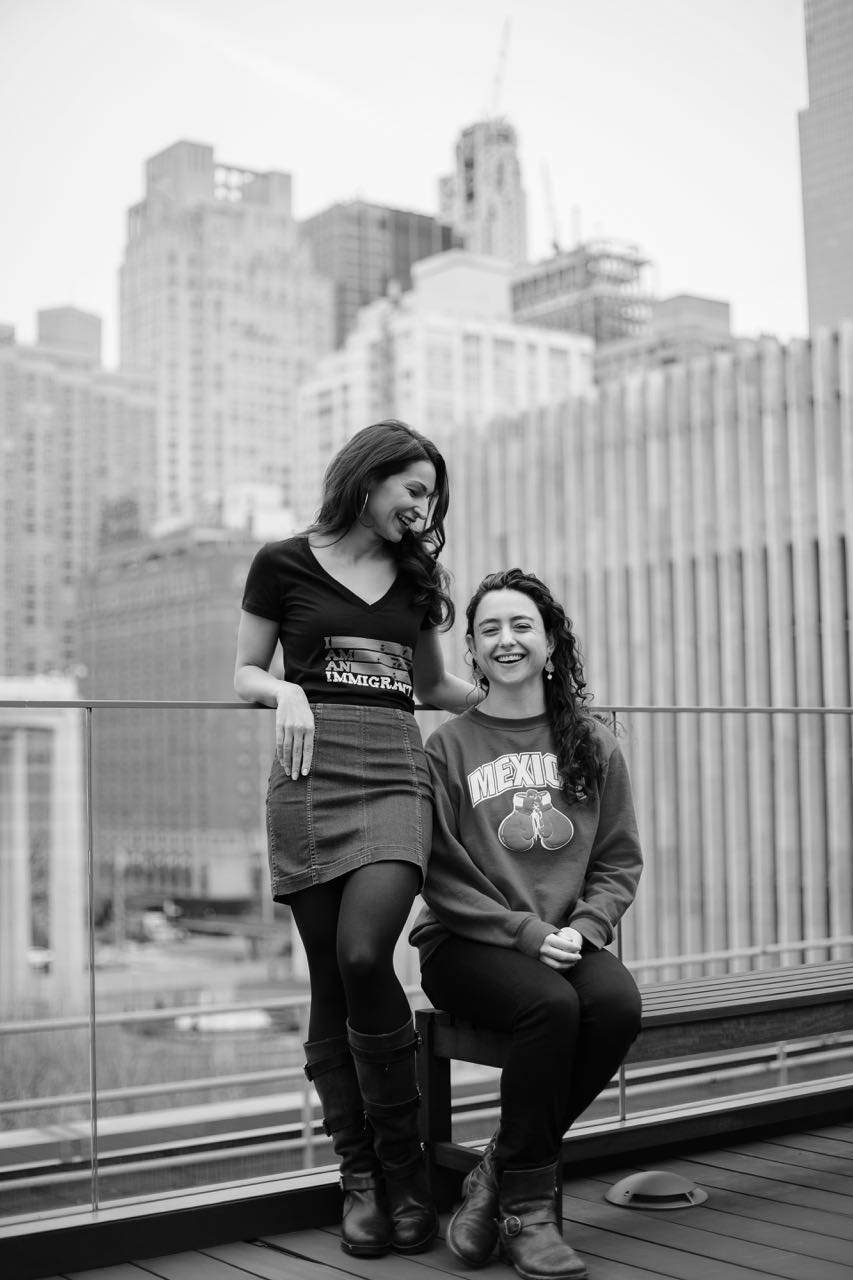
What is your definition of what the American theatre is and should be? What does that mean to you?
Martyna: The same thing that America as a country should be, which is inclusive and respectful of varied opinions. I cannot stress enough—respectful of them—which doesn’t mean agreeing with them, but hearing them. Similar to being other-ed, it would be amazing if we were all given the same respect to be able to say what we want to say outside of other people throwing definitions of who they think we are on us, on the storytellers. I guess what that means for the American theatre is I wish it would be inclusive.
Danya: I think the American theatre should reflect the country and reflect the diversity of voices in the country. I also think that the American theatre should reward talent. I think that a lot of biases impede people from seeing talent because so much is linked to identity and we equate somebody’s personal history with their talent. It feels like that’s not a great thing for people who might just have wild amounts of talent, but they don’t come from somewhere that has a pedigree. So similar to what Martyna said, I think the American theatre should also be a place where plays are produced and not developed.
Martyna: And more female playwrights on Broadway, please.
Danya: And more female directors, as well.
Special Note: The Interval is very excited to invite all of our readers to join us on March 16th for a performance of queens at The Claire Tow Theater at Lincoln Center Theater. Afterward, we’ll be hosting a special, intimate conversation with playwright Martyna Majok and director Danya Taymor.
To learn more about the show and get tickets, click here and use the code: QUEENS30.
Join us for theatre, conversation, and cookies! We hope to see you there!

